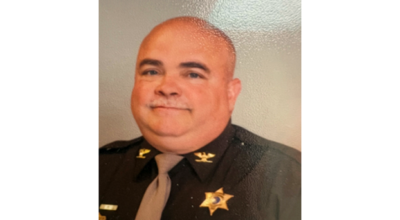Pagel discusses upcoming road funding proposal
Published 8:27 am Monday, March 9, 2015

Rep. Dave Pagel (R-Berrien Springs) visited Cassopolis Thursday evening, explaining to the Cass County Board of Commissioners about the upcoming ballot proposal to fund repairs of state roadways. (Leader photo/TED YOAKUM)
Although it is not necessarily the ideal solution he would have chosen, 78th District Rep. Dave Pagel believes in Lansing’s current plan to rehabilitate the state’s battered roadways.
Pagel was among the hundreds of Michigan lawmakers who participated in the intense debate that raged within the state capital last December, as legislators rushed to find a way to fund more than 1 billion dollars worth of road repairs before the end of the lame duck session. While unable to agree on where to draw the money outright, congress agreed on a compromise that allowed them to repair the state’s infrastructure without significantly impacting funding for schools.
Whether or not this plan works or not will be in the hands of Michigan voters.
During the upcoming elections on May 5, voters will be presented with a ballot proposal that would, among other provisions, raise the state sales tax rate from 6 to 7 percent. If passed, these changes are expected to generate $1.25 billion annually, which would go toward repairing the state’s ailing roads and bridges.
“We’re at 6 percent, Indiana’s at 7 percent,” Pagel said. “Thus with them, we’re still kind of in the middle in terms of sales tax goes among states.”
Rep. Pagel was invited to discuss the upcoming Proposal 1 with the Cass County Board of Commissioners during its meeting Thursday morning. The Republican lawmaker represents voters in Silver Creek, Ontwa, Howard and Milton Townships. He also represents portions of Berrien County as well, including the City of Niles and Buchanan.
Pagel has been making the rounds recently, explaining the proposal to local voters, he said.
“It’s a bill formed by committee, obviously,” he said. “There’s a lot to it, and it’s not all that simple, but bottom line is it will fix the roads, and the main effect you’ll see in your pocket books is that you’ll have to pay a penny more for every dollar worth of taxable product.”
The legislation is the latest attempt at a solution for one of the state’s longest standing issues, with the state’s roadways consistently rated among the worst in the U.S. The main reason for the continual degradation is how infrastructural repairs were funded in the past, using tax from the sale of gasoline, Pagel said. In 1997, the state set a flat tax rate of 19 cents per gallon of oil, which has provided insufficient funding over the last several years.
“It was never indexed for inflation,” Pagel said. “If it was, revenues from that tax would have risen with inflation, and we probably wouldn’t be here today.”
Compounding this issue is the fact that modern vehicles also consume less gasoline per mile, meaning drivers are hitting the pumps less frequently, Pagel added. Another issue is that revenue from gas taxes are currently spilt among infrastructure, public schools and local governments, he said.
“We are paying less in Michigan, on a per capita basis, than any other state in the union for our roads,” Pagel said. “We’re getting what we’re paying for.”
If approved by voters, the proposal will create a system where money generated from gas taxes is devoted solely to roads, with increase revenue from sales tax going toward schools and governments. It will also change the way taxes are applied to gas sales, going from the current flat rate to a rate of 14.9 percent that will fluctuate with the wholesale price of gas, Pagel said.
“The bottom line is, when you go to the pump on May 6, you shouldn’t see that much a difference in price than you did on May 4,” Pagel said. “It will be pretty much the same tax, but it will all go to roads.”
While supported by Pagel and other lawmakers, others, including Michigan Attorney General Bill Schuette, have criticized the plan for raising taxes across the board. Another common criticism of the plan is that the 1 percent sales tax may increase the burden on lower-income families, Pagel said.
For now, the state is leaving everything on the table with its current plan, with everything riding on which box is checked off at polling booths later this spring, Pagel said.
“The truth is, there is no plan B right now [if this fails],” he said. “We’ll be back to the drawing board.”






